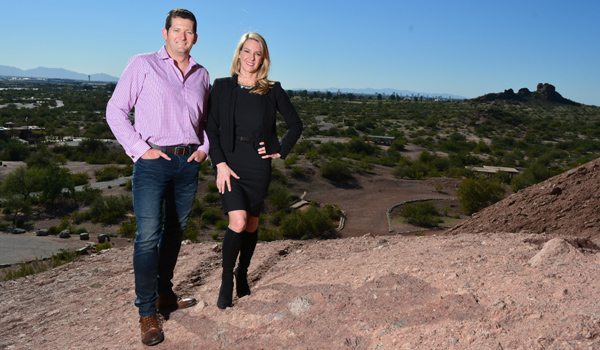The last time Az Business magazine sat down to talk with the leaders of the Arizona Energy Consortium (AEC), the organization was still operating under the umbrella of the Arizona Technology Council.
A lot has changed since that time. Co-executive directors Michelle De Blasi — a director at Fennemore Craig — and Chris Davey — president of EnviroMission and principal at Desert Sky Ventures — talk about the changes the Arizona Energy Consortium has made, its impact on the industry and the state of the energy sector in Arizona.
Az Business: How has the Arizona Energy Consortium formulated its approach to influencing Arizona’s energy industry?
De Blasi and Davey: Established in 2011 as a business consortium to support Arizona’s energy industry, the AEC’s core goals remain to promote policies to strengthen the energy industry, reduce barriers to development and provide a forum for like-minded individuals and companies to network. The Arizona Energy Consortium was formed to be an active industry participant, as opposed to an academic exercise.
One of the most important positive impacts to Arizona’s energy industry is certainty and consistency of policy. The AEC has taken a proactive approach toward this goal. At the AEC’s inception in 2011, Arizona’s solar energy industry was growing quickly. We formulated a Strategic Solar Plan highlight the opportunities and challenges facing the industry. We then worked in collaboration with key stakeholders to develop the Arizona Energy Roadmap, a policy-level business plan for Arizona’s energy industry. The AEC continues to utilize that plan to shape our initiatives and is working on an update to the Roadmap to be released later this year.
Over the past six years, the AEC has been established as its own nonprofit entity, and has grown a strong diverse base of members. We continue to influence the growth of the industry by being a voice of reason in an industry that has unfortunately experienced discord among its various factions. Being the most effective advocate does not always mean being the loudest voice in the room or making front page headlines. The AEC is effective because we work with industry leaders and decision makers in an effective way given Arizona’s conservative political climate. We have published a Project Development Pathway to help affected stakeholders and decision makers understand the impacts of their decisions on the ability of projects to be realized. Since energy development is economic development, this understanding is critical to ensuring the policies put in place help support continued industry retention and growth.
The AEC is proud to continue working with others to build on the foundations of long-term, statewide policies for the energy industry to ensure it is a key economic driver for the state and the region.
AB: What impact has the AEC had on Arizona’s energy industry?
DAD: At its core, the AEC is a business consortium. This is meaningful on several fronts. The AEC provides a collective voice for industry stakeholders, and the ability to share ideas to move the industry forward. Since our members include a broad range of industry experts – from developers to technical consultants, mining companies, financial institutions, manufacturers and service providers – there are many opportunities to collaborate. With the fast-changing landscape of the energy industry, we continuously monitor changing policy and provide our members the opportunity to gain this knowledge and interact with influential speakers and thought leaders within the industry.
The AEC is also a robust place for energy industry members to network and grow their businesses. We hold Energy Drinks networking events bimonthly, providing an opportunity for a member company to host the event and speak about its company. Many business deals and relationships are forged at these events. We also invite member companies to speak periodically at our monthly general meetings about their projects, services or technology and lessons learned, giving our members the ability to showcase their companies to an audience of potential customers. This year we will publish our Member Resource Guide, with detailed company-specific information to better enable our members to do more business together.
The AEC also serves an important role as a place for new businesses to integrate into the community. This is critical to retention of the businesses we attract to this state. Time and again we hear from companies that they appreciate the ability to network with others in the industry, and offer a feeling of community which in the past has been lacking in Arizona. We work with other trade groups to support their initiatives and events, since we feel we all win with a strengthened energy industry.
AB: What is the state of Arizona’s energy industry?
DAD: Arizona currently has a stable energy industry, with many opportunities for growth. To the credit of our utilities, we have a strong diverse portfolio that provides reliable, inexpensive power, especially compared to some of our neighboring states. There is tremendous opportunity for Arizona to take advantage of its vast lands, lower electricity rates and less expensive permitting processes to further develop Arizona as a regional hub. These regional opportunities include our neighboring states, as well as Mexico. As energy storage technologies improve, there will be greater opportunities to export power.
The energy sector touches many industries and countless aspects of our daily lives. If the sector is considered as an economic driver, this sector more than any other could be used to attract and retain other major industry sectors. To do so successfully requires strong supportive policies as well as a diverse mix of resources desired by industry and consumers.
We look forward to exploring the many innovative technologies that will likely change the power industry as we know it. We will continue working to move these conversations forward. A truly sustainable energy industry will need to be diverse, efficient, adaptable and affordable. It must also be realized that the energy industry includes much more than just generation of power – the broader industries that Arizona lobbies to attract are dependent on a strong energy industry that supports the types of generation desired by business and consumers, including renewable energy. The Arizona Energy Consortium will continue to promote certainty of policies which avoid considering the energy industry in a vacuum and promote the strength of our industry, which ultimately impacts the ability to attract and retain other industries.




